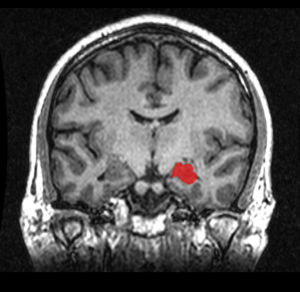The beloved movie ‘50 First Dates’ tells the love story of Lucy and Henry who meet and hit it off one day, causing Henry to think he’s finally found the girl of his dreams. But unfortunately Henry discovers that Lucy has a special type of amnesia caused by an accident, which causes her to forget him once she wakes up the next day. The movie tells their love story and how they eventually overcome this roadblock and live happily ever after.
The movie is a romantic comedy, and is cheesy at some points, but it does do a good job of describing certain aspects that are true for a person experience what is known as ‘Anterograde Amnesia’.
Anterograde amnesia is defined as the inability to code and store long term memory of events that happen after the brain injury, in this case Lucy’s car accident. The brain damage for anterograde amnesia usually affects hippocampus or medial temporal lobe of the brain. In the movie Lucy is told by her doctor that she has experienced brain damage to her temporal lobe, which is an area known to cause anterograde memory loss thus providing some validity to the movie!
(Red dot represents the hippocampus and surrounding temporal lobe area on a MRI scan of the brain.)
Furthermore the movie gets right the fact that Lucy still possesses her semantic and procedural memories, or also known as her implicit memories. She can still understand morality and facts about the world (semantic), and can paint and still follows out her habit of going to the pancake house for breakfast (procedural). But what she can’t do is wake up and form new episodic memories that last more than a day, because as soon as she falls asleep, it’s as if her slate is wiped clean and she is taken back to the day after her car crash, where she experienced her brain injury.
Lastly another thing the movie does that is not necessarily correct on but more an interesting part to address, is the fact that Lucy’s family tries to help Lucy by replicating the day after her accident for her everyday. When Lucy wakes up it is the day after the accident, which is also her father’s birthday, so everyday her father and brother bake a cake and pretend and go along with Lucy and her belief that it’s her Father’s birthday. Additionally they made sure to buy enough newspapers with the same date of after the accident and place them in the pancake house for her so she is not confused by the leap of time that has happened unknowingly to her. Lucy’s family instead of confronting and explaining to her her condition, pretend for her in order to save her any discomfort or confusion, for it it very well documented that anterograde amnesiacs when told about things that have happened to them become very frustrated, sometimes angry and definitely distressed. So the fact that Lucy’s family is saving her from that is an interesting reality of theirs that could possibly be true in a real life anterograde amnesia patient.
However going off that point, the movie is meant to be light in tone, and so the seriousness and detrimental effects anterograde amnesia can have on family and on the patient is lost a little. It is as though the person is forever stuck in the past, and everyone else around them, friends and family, moves on without them in so many ways. The frustration and sadness that is a reality for many anterograde amnesiacs and their families is not very accurately portrayed in the movie, and in that way makes it a bad representation of the amnesia.
(This is a video of Clive Wearing that more accurately depicts the tragic reality anterograde patients and their families face, specifically at 8:00-9:00 and 22:00-25:00)
More over, what is perhaps the biggest point of debate in the movie is that Lucy can remember everything that happens in a full day, and that it is her falling asleep that causes the memories to seemingly dissapear. What most studied anterograde amnesia patients experience is a shortened life span of working memory where they can only hold information ‘in mind’ for anywhere from a matter of seconds or minutes or hours before it dissapears. However a whole day of having her working memory able to work and for me to remember things that happen earlier in the day suggest that Lucy’s problem happens when she sleeps and perhaps when she is consolidating memories and storing them in long term memory. Amnesia is a heterogeneous disorder meaning that it has varying degrees of severity and varies in qualitative aspects, but there are not many other known and studied patients like Lucy and so her type of anterograde amnesia represented in the movie is somewhat debatable in its scientific accuracy.
In conclusion the ending of the film is concerning too as it seems to over simplify the complexity of amnesia. Henry decides that the solution to his problem of loving Lucy and not having her remember him every morning, is that he is going to record their experiences together and have her watch the video once she wakes up in order to orient her to her new reality. Of course in the hollywood movie this works for Lucy, but I can’t help but think that a real life anterograde amnesia would have more trouble accepting that video and would probably be more scared and confused by it then comforted.
So all in all the movie seemed to evenly describe some accurate and not so accurate portrayals of anterograde amnesia. As cognitive science students I hope that watching the movie you will be able to appreciate and be much more informed on the validity of amnesia representations not only in ’50 First Dates’, but representations of amnesia in all future movies that you go and see!
References:
https://www.google.com/search?q=brain+scan+damage+to+medial+temporal+lobe&client=safari&rls=en&source=lnms&tbm=isch&sa=X&ved=0CAcQ_AUoAWoVChMI8MmtqJvcyAIVhXYeCh1JHA8L&biw=1260&bih=647#tbm=isch&q=+damage+to+medial+temporal+lobe+anterograde+brain+scan&imgrc=dvxZmSbL00_b4M%3A
http://www.human-memory.net/disorders_anterograde.html
http://www.mayoclinic.org/diseases-conditions/amnesia/basics/symptoms/con-20033182
https://www.psychologytoday.com/blog/psychologist-the-movies/201212/amnesia-in-50-first-dates
The Students Guide to Cognitive Neuroscience


